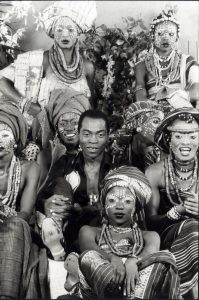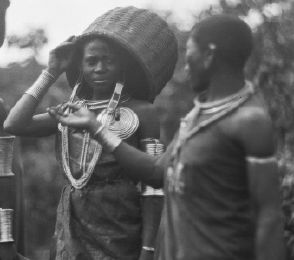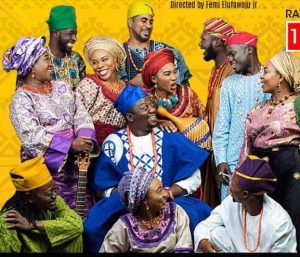The Secret Lives of Baba Segis Wives: Polygamy and Feminism in Nigeria
The Secret Lives of Baba Segis Wives: Polygamy and Feminism in Nigeria
by Onyinye Emeli
Being in St. Olaf College, we are taught mainly with American texts but Professor Richards has made it possible that in her class, we will learn about what feminism is like in various cultures. The Secret Lives of Baba Segis Wives is an eye-opening novel about polygamy in modern-day Nigeria. Bolanle, a university graduate marries into a polygamous family, where she is the fourth wife of a rich traditional patriarch. This book weaves the voices of Baba Segi’s competing wives into a vivid portrait of a rowdy household, evoking an extraordinary Nigerian family.
I have chosen this book to be considered because it digs into a lot of topics that women have to deal with in a typical African household like sex, abortion, pregnancy, education, and gender roles in the household. One would expect this story to take a cliche route of glorifying suffering and the patriarchy in submissive households, instead, it amplifies the realistic lives of many women in marriages.
Important vocabulary:
- Baale-Ile- The head of the household, usually supported by the Iyoaale who distributes the duties to other women in the family.
- Agbo Ile- Family compound headed by the patriarch
- Iya – mother of
- Baba- father of
- Omo- child
- Egbon- senior
- Aburo- junior
*I suggest that you have Google Translate nearby because there are a lot of general expressions that appear in this novel*
How is polygamy practiced in Nigeria?
Polygamy has always been an intricate part of Nigeria’s history. In Nigeria, there are 3 main tribes, the Igbos, Yorubas, and the Hausas who all practiced polygamy most especially in precolonial times. As of 2010, under the current civil law, the country does not recognize polygamous unions but 12 out of 26 states, governed by the Sharia Law still do. In the northern parts of Nigeria ( Hausa tribe) they face the problem of polygamous marriage between men and underaged girls, starting from age 12. Different tribes have the laws in which they follow as to what practice is acceptable when it comes to polygamous marriage. The custom of one man, many wives is acceptable among the Yoruba people and allows men to many as many wives as they are financially capable of. This means if a man can pay the bride price of his wife to be, he can marry her. Keep in mind that bride prices can range from $1 and above, depending on how literate the bride’s family is. A man’s affluence is measured by the number of wives and children he has.

Nigerian artiste, Fela Kuti married 27 wives on the same day!
In Nigeria, men are not the only gender who practice polygamy.

The image above portrays female husbands from the Igbo tribe. In the pre-colonial Igboland, women who were considered exceptional in society, due to their social standing, would marry wives for themselves. This involved two women undergoing the formal marriage rites as in a heterosexual marriage. The woman who paid the brideprice became the husband. A female husband will be regarded and respected like a man and her opinions regarded as valid. She will also participate in any ritual and can associate with men in decision making. This is a big step in a society that is very sexist.
The Secret Lives of Baba Segi’s Wives
Now that I have given some historical context, it is obvious that in Nigeria, Polygamy is not intended to favor women, especially in today’s world. Writer, Lola Shoneyin intends for this story to give the female characters a louder voice, in contrast to what society wants from them.
Much like Macbeth’s Three Witches, The first 3 wives of Baba Segi plot murderous schemes against Bolanle, Baba Segi’s recent college graduate wife.
Baba Segi is depicted as an illiterate man that develops as a character as he navigates his relationships with his different wives. Baba Segi has just married Bolanle, a university graduate, who is having trouble conceiving. The author outlines the importance of independence in marriages. Baba Segi is seen consulting his friends a lot throughout the book, as they give him unsolicited advice on how to ‘handle’ his wives and making sure they are submissive traditional women. The entrance of a university graduate into the family ruffles his equilibrium. Baba Segi cannot possibly fathom the idea of an educated and independent woman, who has explored her sexuality prior to marriage.
The novel casts a transparent glance at both polygamous and monogamous households. It is interesting how the writer criticizes the dominance portrayed in monogamy. Using third-person narration, the author gives voice to its female characters by emphasizing their voices and giving each female character a unique story to them. Unlike many other Nigerian novels centered around marriage, the author makes sure that each woman has a different element to her. She is unique and has her own opinion. Thus, trumping the ideology that once married, women fade into the identity of their husbands.
Finally, the book ends with Bolanle making the ultimate decision to leave this polygamous marriage. This autonomy is something that strikes the reader because stories like this are meant to preach endurance and persevering through the pain. Bolanle gains newfound respect from the wives because she makes this decision for herself that she must leave an environment that does not favor her.

Other noteworthy feminist texts.
This book is definitely one that if read, you’d want to refer to other important Nigerian texts to really grasp what polygamy is and how it affects Nigerian women.
The book, “Feminist insiders-outsiders Muslim women in Nigeria and the Contemporary Movement” by Ibrahim Olatunde tackles some of the struggles that of Muslim women in Nigeria. Due to these hardships, these women have formed activism movements that base their activism on Islamic texts. The author really examines the gender roles practiced in Nigeria and compares them to the teachings of the Quran, urging a heavily religious country like Nigeria to at least follow the teachings of the book they study.
Another noteworthy text that really ties into some of the themes outlined in this book is Barbara Ehrenreich’s Maid to order, outlining the gender roles that are put upon household women. I decided to include this text because this book also touches on Baba Segi’s misogynist thinking that women are meant to be housewives and should earn a living doing household chores. Thus, making them the housekeepers. The idea that women are only subject to domestic chores is one that is still lingering until today in many African households. Surprisingly, as Bolanle enters the household, things change. I added this text because I believe that it is important that we ask ourselves this question- As the world is moving forward, is our way of policing women changing too?
Conclusion
This book is definitely one to be considered. It really touches on female autonomy in marriage, sexuality, and female access to healthcare. Shoneyin does a fantastic job of really weaving together African culture with the western feminist ideologies, showing that these two can coexist. One does not trump the other. She emphasizes that women are to be heard. If they are the backbones of the household like men say they are, then they’re the most important.
Works cited
Ako-Nai, Ronke Iyabowale. Gender and Power Relations in Nigeria. Lanham [Md: Lexington Books, 2013. Print.
Boakye, Bridget, and Facebook. “The Fascinating History of Africa’s Female Husbands.” Face2Face Africa, 5 Apr. 2018, face2faceafrica.com/article/fascinating-history-africas-female-husbands.
Ehrenreich, Barbara, et al. “Maid to Order.” Harper’s Magazine, 18 Mar. 2020, harpers.org/archive/2000/04/maid-to-order/.
Shoneyin, Titilola Alexandrah. The Secret Lives of Baba Segi’s Wives. 1st ed., William Morrow, 2010.
Uthman, Ibrahim Olatunde. Feminist Insiders-Outsiders Muslim Women in Nigeria and the Contemporary Feminist Movement. Newcastle upon Tyne: Cambridge Scholars, 2009. Print.